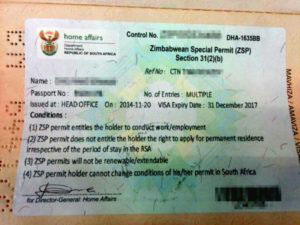
By Gilbert Muponda SEVERAL hundred thousand non-resident Zimbabweans based in South Africa are facing an uncertain future in that country as the grace period for their permits runs out end of 2022.
At least 200 000 Zimbabweans are directly affected. Such a number is too high and significant and calls for other stakeholders to see how they can assist and support alleviate the situation.
The non-resident Zimbabweans have contributed immensely to the Diaspora remittances purse, supporting families back home thereby indirectly becoming a critical contributor to the foreign currency earnings.

As such a national policy position should be taken on how the non-residents Zimbabweans can be assisted to regularise their stay in their host nation.
Whilst it is important that the non-residents should be encouraged to seriously invest back home for the rainy day, it is critical that they get support to do any relocation voluntarily and within reasonable time rather than be chucked out as if they were never once welcome.
Historically most of Sadc countries supplied cheap but a highly reliable labour force, which has helped built the South African economy to what it is today.
Most Zimbabweans would be familiar with the Wenera days when many fathers left their wives, kids and families to work in the South African mines and industries.
- Chamisa under fire over US$120K donation
- Mavhunga puts DeMbare into Chibuku quarterfinals
- Pension funds bet on Cabora Bassa oilfields
- Councils defy govt fire tender directive
Keep Reading
Wenera was derived from WNLA, which is Witwatersrand Native Labour Association. It was an organisation set up specifically to recruit labourers from Countries neighbouring South Africa, especially Zimbabwe, Zambia, Malawi and Mozambique.
This historical movement of labour since the colonial days has never stopped and never been criminalised, as such the current trend and developments in South Africa are worrisome in as much as they feed into the xenophobia attacks against black Africans working in South Africa.
Wenera was developed as a special tactic and strategy to create a pool of cheap labour to work on mines, farms, industries and even homes owned by white settlers, who were trying to create an economy that could compete with Canada, Australia, New Zealand and USA.
Cheap labour was a keep component. This was cheap labour bordering on slavery to propel the South African Economy. Wenera was free to use any and all tactics, including force, bribery, violence, threats and any other criminal means deemed necessary to recruit Zimbabweans, Zambians, Malawians, Mozambicans and many other nationalities.
South Africa even proposed and signed the Salisbury Agreement which said South Africa only gets labour from the then Rhodesia, once its neighbour had satisfied its black labour needs.
Most labour taken died in the mines or farms in South Africa due to hash conditions of service. They ran huge propaganda campaigns sanitising Wenera and gave it a human face despite it being a death sentence to the Zimbabweans and other Sadc citizens caught up.
This gave rise to ’the Compulsory Native Labour Act, “Chibharo Law”, which resulted in all able bodied men being forced to work under slave-like conditions to power mines and farms.
There was a labour war between the South Africans and Rhodesians, resulting in great suffering — the family social fabric being eroded. It is in such context that the South Africans need to be reminded how Sadc nations are inter-related and should pursue mutually beneficial policies rather than short- sighted policies aimed at election cycles and political congresses, whilst ignoring historical foundations built over many decades.
Whilst the non-resident Zimbabweans are encouraged to follow through all legal steps required to fix the residency status, it is clear that on the political front some activity is required.
The South Africans have conveniently let dodgy organisations, such as Operation Dudula and Soweto Parliament play a leading role in harassing black foreigners on the basis of lacking genuine legal papers to work in South Africa, conveniently forgetting the role they played.
The very same economy was partly built by Zimbabweans, Zambians, Malawians and Mozambicans, who had no passports, IDs. They could not even write but were absorbed into the South African labour force, which built the current economy.
Now that calls for a political solution. Whilst the problem appears legal, it is actually a political problem, which calls for a political solution by engaging the South Africans and re-tracing the roots of history.
Deliberate political decisions were made to allow blacks from Sadc to work within South African mines and industry to create a very vibrant economy on the back of such cheap labour with very minimal rights and dignity.
Once that economy grew strong, the blacks were reminded that they were foreigners. They were told to go back home. This precedent should not be allowed to pass.
It must not be treated as normal since it creates unnecessary friction among what should be sister and brother nations and nationalities.
Many South African businesses are present throughout the African continent and operate freely without any discrimination. South African firms, such as Shoprite, Pick’N’Pay, FNB, Old Mutual, Nedbank and MTN. These and many others are freely operating across Africa, in countries where these “unwanted” black Africans come from. Yet such clear facts are ignored and packaged only as if it is South Africa that is losing due to the presence of black Africans within her borders.
Such assessment and conclusions should be challenged and not allowed to stand as South Africa has a historical relevant debt owed to black Africans, who toiled in its mines, farms and industry, much to the detriment of their own families and nations.
Such a conversation must take place despite its unpleasantness or its lack of political correctness.
In the early 1980s and 1990s, it was common to be in the same class with a South African child or have a South African neighbour whilst in Zimbabwe.
These were South Africans running away from apartheid and repression. They were welcomed into Zimbabwean schools, homes, hospital and churches. In short, they were given the freedom of the nation and treated as family.
Now fast forward 10 years, Zimbabwean black workers are not welcome. They are called all sorts of derogatory words despite that historical support, which resulted in many Zimbabweans being killed by apartheid agents in retaliation for Zimbabwe giving refuge to black South Africans? What an irony!
Obviously there was homework done to cleverly cover this operation as to appear to target “illegal” workers. However, the way it is being done, even those who are legally there will somehow live in fear and forever anxious of what might happen next.
Hence, it requires political solution. A political message is clearly in order for people to respect the contribution made by others even though it may now appear as if such a contribution was not critical.
The impact of the role played by Sadc citizens on the South African economy needs to be acknowledged and relevant governments should take the necessary steps to get that acknowledgement.
It is not good enough to run around to stop xenophobic attacks, when preemptive action should be taken to ensure that Sadc citizens are accepted and allowed to work and live in South Africa just as South Africans have a right to live, work and do business in other Sadc countries.
- Muponda is an investment banker, economist and entrepreneur. He holds a B.Comm (Finance) and an MBA. He is a PhD candidate — [email protected]











